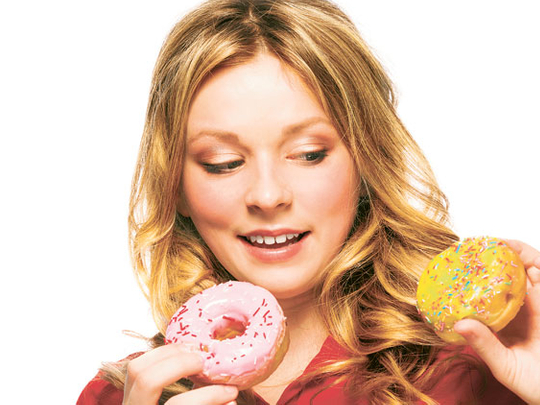
London: We all know how tempting it can be to have one too many chocolates or an extra slice of cake, even when we know it would be healthier not to. But what drives this craving for sweet treats?
Many scientists suggest that we are primed to desire sugar at an instinctive level as it plays such a vital role in our survival. Our sense of taste has evolved to covet the molecules vital to life like salt, fat and sugar.
When we eat food, the simple sugar glucose is absorbed from the intestines into the bloodstream and distributed to all cells of the body.
Glucose is particularly important to the brain as it provides the only source of fuel to the one hundred billion nerve cells called neurons.
Neurons need a constant supply from the bloodstream as they don’t have the ability to store glucose themselves. As diabetics know, someone with low blood sugar can quickly lapse into a coma.
Bizarrely, scientists have found even just the taste of sugar can give our brains a boost. Tests have shown that participants who swill water sweetened by sugar around their mouths perform better on mental tasks than when they gargle artificially sweetened water.
Our tricky relationship with sugar starts at birth, as we are born with a sweet tooth.
A recent study from Washington University, found that newborns have a distinct preference for sweet flavours over other flavours, while children enjoy sugary foods far more than adults.
Many scientists believe a child’s preference for sweet things is an evolutionary hangover, as youngsters who preferred high-calorie foods in times gone by would have had a better chance of survival when food sources were unreliable.
The problem now is that refined sugar is too readily available and this could be part of the reason why childhood obesity rates have soared.
Healthcare professionals now recommend that parents avoid giving babies sweet things to eat or drink to try to stop them developing a preference for them early in life.
Why do some people binge on sugar?
Eating too much sugar can lead to unhealthy eating patterns. Sugar can be a mood-booster as it prompts the body to release the ‘happy hormone’ serotonin into the blood stream.
The instant ‘lift’ we get from sugar is one of the reasons we turn to it at times of celebration or when we crave comfort and reward.
However, the pleasant sugar rush triggers an increase in insulin as the body strives to bring blood glucose levels back to normal. This has the knock-on effect of causing a ‘sugar crash’ and makes many crave yet more sugar, which can lead to a cycle of binge-eating.
We don’t know when enough is enough
Added to this, our bodies aren’t able to tell when we’ve had enough of certain types of sugar. Researchers have found that food and drinks sweetened with the simple sugar fructose do not trigger the same sense of fullness as other foods with similar calories.
A study from Yale University found that while glucose suppressed the parts of the brain that make us want to eat; fructose did not. The test participants also reported feeling more satisfied after consuming glucose compared to fructose. Taken together these two aspects increase the risk of overeating.
Many processed foods are excessively sweetened by sucrose, which contains 50% fructose. In fact you may be surprised by just how much sugar is hidden in common foods.
So next time you get caught with your hand in the cookie jar, at least you’ll know why.
So how much is too much?
The sugar fructose doesn’t make you feel as full as glucose
The body is unable to distinguish between natural sugar found in fruit, honey, or milk, and processed sugar from sugar cane or beet.
All sugars are broken down by the body into glucose and fructose and are processed in the liver. Sugars are converted into glycogen or fat for storage, or kept as glucose in the blood for use in the body’s cells. So it’s the quantity you consume that makes the difference to your health.
Sugars shouldn’t make up more than 10% of the energy you get from food and drink each day. This is whether it comes from honey, fruit juice and jam, or soft drinks, processed foods or table sugar.
This works out at about 70g a day for men and 50g for women, although this can vary depending on your size, age and how active you are. Fifty grams of sugar is equivalent to 13 teaspoons of sugar a day, or two cans of fizzy drink, or eight chocolate biscuits.
When in the supermarket it’s worth remembering that produce is classed as high in sugar if it contains more than 15g in 100g and low in sugar if it has less than 5g per 100g.
—Compiled from agencies












